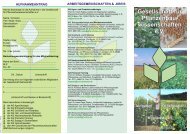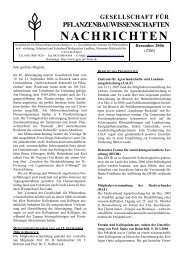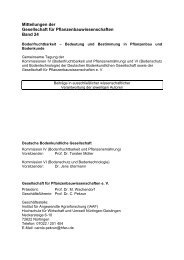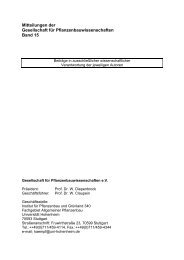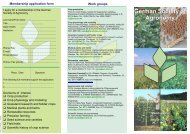Mitteilungen der Gesellschaft für Pflanzenbauwissenschaften Band 23
Mitteilungen der Gesellschaft für Pflanzenbauwissenschaften Band 23
Mitteilungen der Gesellschaft für Pflanzenbauwissenschaften Band 23
Sie wollen auch ein ePaper? Erhöhen Sie die Reichweite Ihrer Titel.
YUMPU macht aus Druck-PDFs automatisch weboptimierte ePaper, die Google liebt.
Mitt. Ges. Pflanzenbauwiss. <strong>23</strong>: 188 (2011)<br />
Effect of Ca supply on cytosolic pH and Ca in leaves of wheat<br />
plants growing un<strong>der</strong> NaCl stress<br />
Sherif H. Morgan 1,2,3 , Sylvia Lindberg 2 and Karl H. Mühling 1<br />
1 Institute for Plant Nutrition and Soil Science, Christian-Albrechts-University, Kiel, Germany; 2 Botany<br />
Department, Stockholm University, Stockholm, Sweden; 3 Plant Physiology Section, Plant Botany<br />
Department, Faculty of Agriculture, Cairo University, Giza, Egypt. E-Mail: dr.morgan77@yahoo.com<br />
Introduction<br />
Calcium maintains the cell wall and membranes structures as well as many other<br />
physiological processes. Also Ca influence both growth and, as a ubiquitous second<br />
messenger in plants, Ca influencing the plant responses to stress. Perception of salt<br />
stress in plant cells induces a change in cytosolic Ca, [Ca 2+ ]cyt, Na + , [Na + ]cyt and pH,<br />
[pH]cyt, which in resistant cultivars transfers downstream reactions toward salt<br />
resistant [1]. Upon short-term salt stress (minutes or hours) there are transient shifts<br />
in [Ca 2+ ]cyt and pHcyt but little is known about the long-term effects (days) by salinity<br />
on [Ca 2+ ]cyt and [pH]cyt levels. Therefore, we focused on measuring the [Ca 2+ ]cyt and<br />
[Na + ]cyt concentrations and [pH]cyt to investigate if a relation existed between changes<br />
in [Ca 2+ ]cyt and [pH]cyt in response to external supplied Ca 2+ and/or NaCl approaching<br />
to have more clear vision to un<strong>der</strong>stand the behaviour of the plant un<strong>der</strong> salinity.<br />
Materials and Methods<br />
The effect of salinity (0 and 50 mM NaCl) was investigated on wheat seedlings cv.<br />
Seeds1 during 7 d of cultivation in hydroponics, with and without extra Ca addition (0<br />
and 5 mM CaSO4). Protoplasts were isolated by an enzymatic method [2] and Fura2-<br />
AM, SBFI-AM and BCECF-AM were loaded for detecting [Ca 2+ ]cyt [3], [Na + ]cyt [4] and<br />
[pH]cyt [2], respectively, using fluorescence microscopy. Data were statistically<br />
analyzed using two factorial completely randomized design (CRD) and means were<br />
compared using the least significant difference test (L.S.D.) at 5% level of probability.<br />
Results and Discussion<br />
Less Ca 2+ was taken up into the cytosol of leaf protoplast un<strong>der</strong> salinity when<br />
compared with control plants. While contrarily was reported with extra Ca 2+ addition<br />
only at saline condition, which could indicate that, the long-term changes of [Ca]cyt<br />
level are both salinity and Ca dependant. Moreover, irrespective of Ca 2+ treatment,<br />
the [pH]cyt increased upon salinity treatment, while [Na]cyt did not change significantly.<br />
References<br />
1. Ka<strong>der</strong> MA, Lindberg S. 2010: Cytosolic calcium and pH signaling in plants un<strong>der</strong> salinity stress.<br />
Plant Signaling Behavior 5(3):<strong>23</strong>3-<strong>23</strong>8.<br />
2. Lindberg S, Strid H. 1997: Aluminium induces rapid changes in cytosolic pH and free calcium and<br />
potassium concentrations in root protoplasts of wheat (Triticum aestivum). Physiol Plant 99:405-14.<br />
3. Shishova M, Lindberg S. 2004: Auxin induces an increase of Ca 2+ concentration in the cytosol of<br />
wheat leaf protoplasts. J Plant Physiol 161:937-945.<br />
4. Ka<strong>der</strong> MA, Lindberg S. 2005: Uptake of sodium in protoplasts of salt-sensitive and salt-tolerant<br />
cultivars of rice, Oryza sativa L. determined by the fluorescent dye SBFI. J Exp Bot 56:3149-3158.



